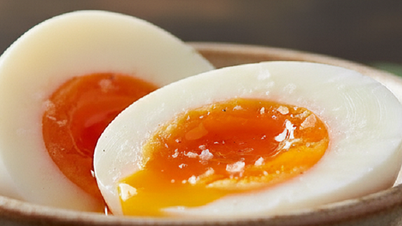Eggs are a familiar food, easy to prepare and rich in nutritional value. Scientists consider eggs to be "nature's multivitamin" because they contain more than 13 important vitamins and minerals such as vitamin D, B12, selenium, iodine and choline. Notably, the content of these substances is not evenly distributed - the white and yolk each have their own role and benefits for health.
1. Nutrition of eggs
- 1. Nutrition of eggs
- 2. Nutrients in egg whites
- 3. Nutrients in egg yolks
- 4. Egg Whites vs. Egg Yolks: Nutritional Differences and Smart Choices
- 5. Health benefits of each part
- 6. Who should choose egg whites, who should eat the whole egg?
Eggs have long been considered a complete food thanks to their balanced composition of high-quality protein, healthy fats, vitamins and minerals.
According to the United States Department of Agriculture (USDA) and studies published on ScienceDirect , the protein in eggs has a biological value of nearly 100 – a near-perfect level, showing that the body absorbs and uses it very effectively. Thanks to that, eggs are especially useful for muscle recovery and development.
Not only rich in protein, eggs are also a rich source of choline – an essential nutrient that helps enhance brain function and support fetal brain development. Some recent studies have also shown that, when consumed in moderation, eggs can contribute to improving cardiovascular health.
It can be said that eggs are a simple food but bring many benefits to the body: from maintaining muscles, protecting the brain, to supporting eyesight and balancing metabolism.

The nutrients in eggs may contribute to improved heart health.
2. Nutrients in egg whites
Egg whites make up about 60% of the weight of the whole egg, and are the clear part surrounding the yolk. They are a source of pure protein, low in calories and virtually fat-free, making them popular in healthy or weight-loss diets.
- Protein: Egg whites provide more than half of the total protein of the egg, with high biological quality, easy to absorb and use for muscle building, recovery and tissue regeneration.
- Micronutrients: According to data from the US National Institutes of Health (NIH), egg whites contain small amounts of vitamin B2 (riboflavin) and trace minerals such as potassium, magnesium and sodium - essential elements to help maintain muscle function, the nervous system and electrolyte balance.
- Fat-soluble vitamins: Egg whites do not contain fat-soluble vitamins (A, D, E, K), because there is almost no fat - the necessary medium to absorb and transport these vitamins.
Thanks to its rich protein but low energy and fat properties, egg whites are often used in diets, bodybuilding menus or when cholesterol control is needed.

The nutrients in egg whites are popular in a healthy or weight loss diet.
3. Nutrients in egg yolks
The egg yolk accounts for about 30 - 35% of the total weight of the egg, and is the part that contains most of the essential nutrients. This is considered the real "nutritional storehouse" of eggs, rich in vitamins, minerals, healthy fats and highly bioactive proteins.
- Protein: Although egg whites contain more protein by weight, yolks are more concentrated in protein. According to research from the National Institutes of Health (NIH), proteins unique to the yolk, such as phosvitin, livetin, and lipovitellin, have antioxidant, immune-enhancing, and cell-repairing properties—roles that egg whites do not have.
- Micronutrients: Egg yolks are a major source of vitamins and minerals, including vitamin B6, B12, folate, along with selenium, zinc, iron and phosphorus – important elements for energy, the immune system and blood formation.
- Choline: According to the NIH Office of Dietary Supplements, egg yolks are the richest natural source of choline in the diet. This nutrient helps brain development, protects liver function, and plays an important role during pregnancy to support the formation of the fetal neural tube.
Thanks to its combination of quality protein, healthy fats and a variety of micronutrients, the egg yolk is the part that offers the most nutritional value – although it should also be consumed in moderation due to its natural cholesterol content.

The egg yolk is the part that provides the highest nutritional value.
4. Egg Whites vs. Egg Yolks: Nutritional Differences and Smart Choices
Both egg whites and yolks offer distinct health benefits. Egg whites are prized for being low in calories, cholesterol-free, and rich in pure protein, while the yolk is the “nutritional center” containing most of the vitamins, minerals, healthy fats, and antioxidants.
Compare protein and nutritional composition
- Protein: Although egg whites provide more than half of the total protein in an egg, the yolk actually has a higher protein concentration by weight – about 16.4g/100g, compared to 10.8g/100g in the white. However, because the white takes up more volume, it remains the main source of protein in the diet.
- Nutrition: Egg yolks excel in overall nutrient density, providing fat-soluble vitamins (A, D, E, K), B vitamins, minerals such as iron, selenium, zinc, along with healthy fats and omega-3 fatty acids. In addition, choline in egg yolks plays an important role in the brain and liver, helping to maintain memory and nerve function.
5. Health benefits of each part
- Egg whites: Thanks to their lean, fat-free protein content, egg whites are an ideal choice for people trying to lose weight, athletes, or those looking to gain muscle. According to the American Journal of Clinical Nutrition , egg white protein is as effective at stimulating muscle synthesis as whey protein, a type commonly used in bodybuilding.
- Egg yolks: Providing choline, lutein and zeaxanthin, egg yolks help develop the brain, improve memory and protect eyesight. Many studies show that these two carotenoids help protect the retina and reduce the risk of age-related macular degeneration.
6. Who should choose egg whites, who should eat the whole egg?
- People who are losing weight or exercising: Should prioritize egg whites, because they provide pure protein, low calories, and no cholesterol.
- Pregnant women, the elderly, and people who do mental work: Should eat the whole egg, especially the yolk, to absorb choline, vitamin D and lutein - important nutrients for the brain, eyes and hormones.
- People with heart disease or high cholesterol: There is no need to completely eliminate egg yolks, but should eat them in moderation (about 3-4 eggs/week, depending on physical condition), while maintaining a balanced diet low in saturated fat.
Please watch more videos:
Source: https://suckhoedoisong.vn/long-trang-hay-long-do-phan-nao-cua-qua-trung-nhieu-protein-va-bo-duong-hon-169251101131830161.htm


![[Photo] Ca Mau "struggling" to cope with the highest tide of the year, forecast to exceed alert level 3](https://vphoto.vietnam.vn/thumb/1200x675/vietnam/resource/IMAGE/2025/11/04/1762235371445_ndo_br_trieu-cuong-2-6486-jpg.webp)
![[Photo] Ho Chi Minh City Youth Take Action for a Cleaner Environment](https://vphoto.vietnam.vn/thumb/1200x675/vietnam/resource/IMAGE/2025/11/04/1762233574890_550816358-1108586934787014-6430522970717297480-n-1-jpg.webp)
![[Photo] The road connecting Dong Nai with Ho Chi Minh City is still unfinished after 5 years of construction.](https://vphoto.vietnam.vn/thumb/1200x675/vietnam/resource/IMAGE/2025/11/04/1762241675985_ndo_br_dji-20251104104418-0635-d-resize-1295-jpg.webp)

![[Photo] Panorama of the Patriotic Emulation Congress of Nhan Dan Newspaper for the period 2025-2030](https://vphoto.vietnam.vn/thumb/1200x675/vietnam/resource/IMAGE/2025/11/04/1762252775462_ndo_br_dhthiduayeuncbaond-6125-jpg.webp)





































































































Comment (0)